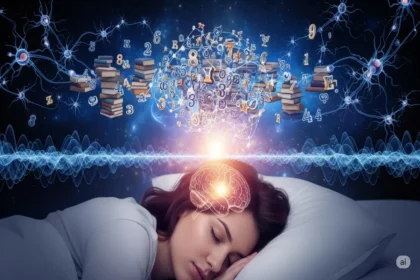The quest for a truly restorative night’s sleep often leads us down paths of elaborate bedtime routines, blackout curtains, and expensive mattresses. Yet, one of the most fundamental, often overlooked, keys to unlocking peaceful slumber lies much closer to home: on our dinner plates. The intricate relationship between what we consume and how we sleep is a burgeoning field of scientific inquiry, revealing that the right Food for Sleep can act as a powerful natural sedative, while the wrong choices can be potent sleep disruptors. Understanding this surprising link between our diet and our nocturnal rest is a transformative step towards reclaiming the deep, rejuvenating sleep our bodies and minds desperately need.
Imagine Sarah, a busy professional, who for years struggled with restless nights. She’d try meditation, warm baths, but still found herself tossing and turning. Then, on a whim, she started paying attention to her evening meals. She swapped her late-night spicy takeout for a lighter meal of salmon and a small bowl of cherries. Within a week, she noticed a remarkable difference: she was falling asleep faster and waking up feeling genuinely refreshed. Sarah’s experience isn’t just anecdotal; it mirrors a growing body of scientific evidence suggesting that our dietary choices profoundly influence the quality and duration of our sleep.
The Gut-Brain-Sleep Connection: A Complex Web
The link between food and sleep is not as simple as eating a specific food and instantly falling asleep. It involves a complex interplay between our digestive system, our brain, and the intricate hormonal and neurotransmitter systems that regulate sleep. This connection is often referred to as the “gut-brain axis,” and sleep is a crucial part of this dialogue.
Our gut, often called the “second brain,” produces a significant amount of neurotransmitters, including serotonin, a precursor to melatonin – the hormone that signals to our bodies that it’s time to sleep. The nutrients we absorb from food directly influence the production of these vital compounds. Moreover, a healthy gut microbiome (the community of bacteria in our intestines) is increasingly recognized for its role in influencing mood, stress, and sleep patterns. When our diet is unbalanced, it can disrupt this delicate ecosystem, sending ripples through our entire system, including our sleep.
Building Blocks for Better Sleep: Key Nutrients
Certain nutrients play critical roles in the processes that promote sleep. Ensuring an adequate intake of these can significantly support your body’s natural sleep mechanisms.
1. Tryptophan: The Melatonin Precursor
Tryptophan is an essential amino acid, meaning our bodies cannot produce it and we must obtain it through diet. It’s a direct precursor to serotonin, which is then converted into melatonin. Melatonin is the “darkness hormone” that signals to the brain that it’s time to initiate sleep.
- Scientific Insight: Research published in the Journal of Psychiatric Research has explored tryptophan’s role in sleep. While consuming tryptophan-rich foods alone might not be a magic bullet (as other amino acids compete for absorption into the brain), combining them with complex carbohydrates can help. Carbohydrates trigger insulin release, which helps clear competing amino acids from the bloodstream, allowing more tryptophan to cross the blood-brain barrier.
2. Melatonin: Direct Sleep Signal
While our bodies produce melatonin, certain foods contain it naturally, offering a direct boost to sleep-inducing signals.
- Scientific Insight: Studies have shown that consuming foods rich in melatonin can indeed increase circulating melatonin levels. For example, a study in the Journal of Agricultural and Food Chemistry highlighted cherries, particularly tart cherries, as a significant natural source of melatonin.
3. Magnesium: The Relaxation Mineral
Magnesium is a vital mineral involved in over 300 biochemical reactions in the body, many of which are crucial for sleep. It helps regulate neurotransmitters that promote calm, such as GABA (gamma-aminobutyric acid), which reduces nerve activity. Magnesium also helps relax muscles and can alleviate restless legs syndrome in some cases.
- Scientific Insight: A review in the Journal of Research in Medical Sciences noted that magnesium supplementation improved insomnia symptoms in older adults, suggesting its crucial role in sleep regulation.
4. Calcium: More Than Just Bones
Calcium is not only essential for strong bones but also plays a role in sleep. It helps the brain use tryptophan to produce melatonin.
- Scientific Insight: Research indicates that calcium levels in the body are higher during deeper sleep stages, suggesting its involvement in sleep architecture.
5. B Vitamins: Energy and Neurotransmitter Support
B vitamins, particularly B6, B9 (folate), and B12, are crucial for the production of neurotransmitters like serotonin and melatonin. Vitamin B6, for instance, is a co-factor in the conversion of tryptophan to serotonin.
- Scientific Insight: While not direct sleep aids, deficiencies in B vitamins can impact neurotransmitter synthesis, potentially contributing to sleep problems.
6. Complex Carbohydrates: The Tryptophan Transport System
As mentioned, complex carbohydrates (like whole grains) are important not for their direct sleep-inducing properties, but because they facilitate the transport of tryptophan into the brain. They also provide a steady release of glucose, which can help maintain stable blood sugar levels throughout the night, preventing awakenings due to hunger or blood sugar dips.
Sleep-Promoting Foods: Your Nighttime Allies
Incorporating these nutrient-rich foods into your diet, particularly in the evening, can create a more conducive environment for sleep.
- Tart Cherries (and Tart Cherry Juice): These are perhaps the most celebrated natural sleep aids. They are one of the few food sources of melatonin and also contain tryptophan. A small glass of tart cherry juice an hour or two before bed has shown promise in improving sleep duration and quality in several studies.
- Almonds and Walnuts: Excellent sources of magnesium and melatonin. Walnuts also contain tryptophan. A small handful can be a perfect bedtime snack.
- Fatty Fish (Salmon, Tuna, Mackerel): Rich in Vitamin D and Omega-3 fatty acids (EPA and DHA). Research suggests that a combination of Omega-3s and Vitamin D can boost serotonin production and improve sleep quality.
- Warm Milk: A classic remedy, and for good reason. Milk contains tryptophan and calcium. The warmth can also be psychologically soothing.
- Kiwi: Studies have shown that eating two kiwis an hour before bed can significantly improve sleep onset, duration, and efficiency. Kiwis contain serotonin, antioxidants, and other compounds beneficial for sleep.
- Bananas: A good source of tryptophan, magnesium, and potassium, all of which aid in muscle relaxation and sleep.
- Whole Grains (Oats, Whole-Wheat Bread): Provide complex carbohydrates that help transport tryptophan to the brain. A small bowl of oatmeal or a slice of whole-wheat toast with a little nut butter can be a good evening snack.
- Leafy Greens (Spinach, Kale): Rich in magnesium and calcium.
- Poultry (Turkey, Chicken): Well-known for their tryptophan content. While a large turkey dinner might make you sleepy, it’s often due to the sheer volume of food and the subsequent digestive effort rather than just the tryptophan. A smaller, lean portion is more advisable.
Foods and Drinks to Avoid: The Sleep Saboteurs
Just as some foods promote sleep, others actively work against it. Avoiding or limiting these, especially in the hours leading up to bedtime, is crucial.
1. Caffeine: The Obvious Culprit
Caffeine is a stimulant that blocks adenosine, a brain chemical that promotes sleepiness. Its effects can last for many hours.
- Scientific Insight: The half-life of caffeine is about 5-6 hours, meaning half of the caffeine is still in your system 5-6 hours after consumption. For some, it can linger much longer. Consuming caffeine too late in the day can significantly delay sleep onset and disrupt sleep architecture. Avoid caffeine (coffee, tea, energy drinks, chocolate) at least 6-8 hours before bedtime.
2. Alcohol: The False Friend
Many people use alcohol as a “nightcap” to relax and fall asleep. While it can induce drowsiness initially, alcohol severely disrupts sleep architecture, particularly REM sleep, later in the night.
- Scientific Insight: Alcohol metabolization produces acetaldehyde, a stimulant that can cause awakenings and fragmented sleep in the latter half of the night. It also exacerbates snoring and can worsen sleep apnea by relaxing throat muscles. Avoid alcohol at least 3-4 hours before bed.
3. Heavy, Fatty, and Spicy Meals: Digestive Disruptors
Eating large, heavy, or fatty meals close to bedtime forces your digestive system to work overtime, which can interfere with sleep. Spicy foods can cause indigestion and heartburn, leading to discomfort that keeps you awake.
- Scientific Insight: Digestion raises core body temperature, which is counterproductive to sleep, as our body temperature needs to drop slightly to initiate sleep. Aim to finish your last large meal at least 2-3 hours before bedtime.
4. Sugary Foods and Refined Carbohydrates: The Blood Sugar Rollercoaster
While complex carbs are good, simple sugars and refined carbohydrates (like white bread, pastries, sugary cereals) cause a rapid spike and then crash in blood sugar. This crash can trigger the release of adrenaline and cortisol, stress hormones that can wake you up or make it difficult to fall back asleep.
5. High-Protein Meals (Alone): The Tryptophan Competitor
While protein is essential, a meal consisting only of high protein without sufficient carbohydrates can hinder tryptophan’s journey to the brain, as other amino acids will outcompete it. Balance is key.
Timing is Key: When to Eat for Sleep
It’s not just what you eat, but when you eat it.
- Dinner Timing: Aim to finish your main meal at least 2-3 hours before bedtime to allow for adequate digestion.
- Light Bedtime Snack: If you feel hungry closer to bedtime, opt for a small, easily digestible snack that combines a complex carbohydrate with a tryptophan-rich food (e.g., a small bowl of oatmeal, a banana with a few almonds, whole-wheat toast with a thin layer of turkey). Avoid anything heavy or sugary.
Beyond the Plate: A Holistic Approach
While diet plays a significant role, it’s part of a larger sleep hygiene puzzle. For optimal sleep, also consider:
- Consistent Sleep Schedule: Go to bed and wake up at the same time every day.
- Optimized Sleep Environment: Dark, quiet, and cool bedroom.
- Stress Management: Practice relaxation techniques like meditation or deep breathing.
- Regular Exercise: But avoid intense workouts too close to bedtime.
- Limit Screen Time: Avoid blue light from electronic devices at least an hour before bed.
- Address Underlying Conditions: If you suspect a sleep disorder (like sleep apnea or RLS), consult a healthcare professional.
Conclusion: Nourishing Your Way to Rest
The journey to a truly restful night often begins not in the bedroom, but in the kitchen. The science of Food for Sleep reveals that our dietary choices are powerful levers in regulating our body’s natural sleep-wake cycles. By consciously incorporating sleep-promoting nutrients and thoughtfully avoiding sleep-disrupting culprits, we can create a harmonious internal environment that guides us gently into slumber.
It’s a testament to the profound interconnectedness of our bodies, where the seemingly simple act of eating can profoundly influence the most fundamental aspect of our well-being. So, the next time you prepare a meal, remember that you’re not just nourishing your body for the day ahead, but also laying the groundwork for the restorative peace of the night. Embrace these insights, make informed choices, and discover the transformative power of nourishing your way to truly restful sleep.
Disclaimer: The information provided in this article is for general informational purposes only and does not constitute medical advice. It is not a substitute for professional medical advice, diagnosis, or treatment. Always seek the advice of your physician or other qualified health provider with any questions you may have regarding a medical condition. Never disregard professional medical advice or delay in seeking it because of something you have read on this website.














